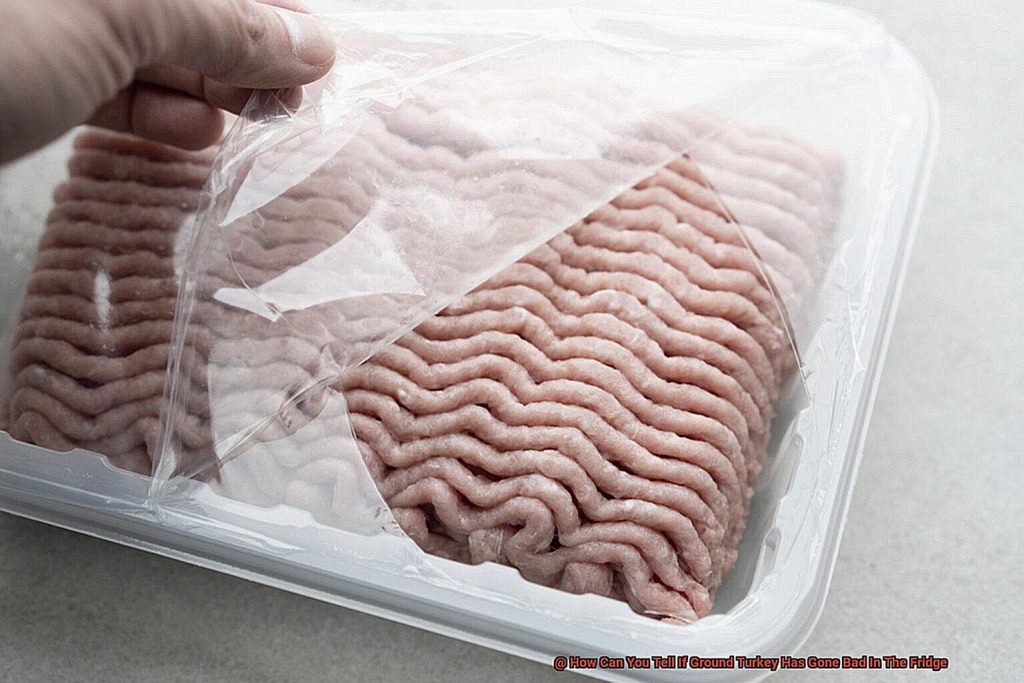Do you love using ground turkey in your meals, but worry about its freshness? It’s a common concern for anyone who wants to avoid foodborne illnesses. But fear not. It’s easy to tell if your ground turkey has gone bad in the fridge.
First things first, use your senses. Take a deep sniff of the turkey to see if it has any off or foul odors. If it smells rotten, it’s likely gone bad and should be thrown out. Next, pay attention to the texture of the turkey. If it feels slimy or sticky, that’s another sign that it’s no longer safe to eat.
These warning signs are crucial because ground turkey can harbor harmful bacteria such as salmonella and E. coli if it has been mishandled or stored improperly.
So how can you prevent your ground turkey from going bad in the first place? One way is to make sure it’s stored properly in the fridge. Keep it in its original packaging and use it within three to four days of purchase. If you’re not planning on using it within that timeframe, consider freezing it instead.
By staying vigilant for signs that your ground turkey has gone bad and taking steps to prevent spoilage, you can ensure that your meals are both delicious and safe to eat.
Contents
Checking the Expiration Date
The expiration date is a crucial factor in determining the freshness of the meat and can protect you from potential foodborne illnesses.
Here are some key sub-topics and tips to keep in mind when checking the expiration date of your ground turkey:
- Shelf life: Ground turkey typically has a shelf life of three to four days in the refrigerator after it has been opened. However, this can vary depending on how fresh the meat was when you purchased it and how well it has been stored.
- Labeling: Look for the label on the packaging which usually has a sell-by or use-by date printed on it. If the date has passed, it is best to err on the side of caution and discard the meat. Even if it looks and smells fine, consuming expired meat can put you at risk of foodborne illness.
- Safe food handling practices: Ground turkey can go bad before the expiration date if it has not been stored properly. Follow safe food handling practices such as keeping the meat refrigerated at all times and cooking it thoroughly before consuming. This includes defrosting frozen ground turkey in the refrigerator or microwave, not at room temperature.
- Signs of spoilage: In addition to checking the expiration date, inspect the meat for any signs of spoilage such as an off odor or slimy texture. If the meat appears discolored or has a foul smell, it is best to discard it immediately.

To further ensure safety, cook ground turkey to an internal temperature of 165°F, which will kill any potential pathogens. Use a meat thermometer to check the temperature in the thickest part of the meat.
Inspecting the Color and Texture of the Meat
Fresh ground turkey should have a pleasing pinkish color, without any discoloration or dark spots. Any brown, grey, or greenish tinge on the meat is an indication that the turkey has spoiled and should not be consumed.
Texture is another vital factor to consider when inspecting the meat. Fresh ground turkey should have a uniform texture and feel slightly sticky to the touch. However, if the meat feels slimy or has a mushy texture, then it’s time to discard it as it is no longer safe to eat. Texture is an important indicator of freshness, so it’s crucial to pay attention to it when inspecting your ground turkey.
In addition to color and texture, you must also consider the smell of the meat. If you notice any foul or unusual odors coming from your ground turkey, it’s best to discard it immediately. The smell of spoiled meat is usually very distinct and unpleasant, so trust your nose and don’t take any chances.
It’s also important to remember that proper storage does not guarantee freshness. Ground turkey can go bad even if stored correctly in the fridge. To reduce the risk of food poisoning, never keep ground turkey for more than three days in the fridge after purchase. Always check the expiration date on the packaging before buying ground turkey and avoid purchasing expired packages.
To sum up, inspecting the color, texture, and smell of ground turkey is crucial in ensuring its safety for consumption. Always trust your senses to detect any signs of spoilage and discard any meat that does not meet these standards. Remember to store ground turkey properly and consume it within a few days of purchase to minimize the risk of foodborne illnesses. Stay safe and enjoy your meals.
In conclusion, here are some helpful tips to keep in mind when inspecting the color and texture of ground turkey:
Evaluating the Smell of Ground Turkey
We have gathered some valuable information for you.
To begin with, your nose is the best tool when it comes to assessing the freshness of ground turkey. If there is an off-putting, pungent smell emanating from the package, it’s a clear sign that the meat has gone bad and should not be consumed. On the other hand, a fresh package of ground turkey will have a mild, slightly sweet aroma.
As ground turkey begins to spoil, its smell becomes more pronounced and may even have a sour or ammonia-like odor. It’s crucial to be cautious with spoiled meat as consuming it can lead to foodborne illnesses. Therefore, if you’re unsure whether the ground turkey is still safe to eat, cook a small amount and give it a taste test. Discard it immediately if it tastes off or has an unusual texture.
In addition to that, if you’ve stored ground turkey in the fridge for too long, it may develop a freezer burn smell. This happens when moisture evaporates from the surface of the meat, causing it to dry out and become tough. Although this doesn’t necessarily indicate that the ground turkey has gone bad, it might not taste as great as fresh meat.
Foodborne Illnesses Caused by Spoiled Ground Turkey
That’s right, if not handled and cooked properly, it can lead to some pretty nasty foodborne illnesses. Let’s explore the risks associated with consuming spoiled ground turkey and how to prevent foodborne illnesses caused by it.
Firstly, the larger surface area of ground turkey gives bacteria more opportunities to contaminate the meat during processing, transportation, storage, and preparation. Salmonella and Campylobacter are two common types of bacteria that can cause food poisoning from contaminated ground turkey. Symptoms of these illnesses include diarrhea, fever, abdominal cramps, and nausea. In severe cases, medical attention may be required.
To avoid these unpleasant symptoms, proper handling and storage of ground turkey are crucial. Always wash your hands before and after handling raw meat and clean any surfaces or utensils that come into contact with it. If you notice any signs of spoilage, such as an off odor or slimy texture, do not consume the meat.
Proper storage is also key in preventing spoilage. The ideal temperature range for storing raw meat is between 32°F and 40°F. If your fridge is warmer than this range, the meat may spoil more quickly and become unsafe to eat.
Cooking your ground turkey thoroughly will help kill any harmful bacteria that may be present. The internal temperature of the meat should reach 165°F to be considered safe for consumption. Use a thermometer to ensure that your meat has reached the proper temperature.
Temperature Guidelines for Cooking Ground Turkey
If so, it’s vital to follow temperature guidelines to ensure that your meals are both delicious and safe to eat. Ground turkey can be a breeding ground for harmful bacteria like salmonella and E. coli if not cooked correctly. To prevent any potential foodborne illness, let’s dive into some essential tips for cooking and reheating ground turkey.
Firstly, the USDA recommends cooking ground turkey to an internal temperature of 165°F (74°C). This temperature ensures that any potential bacteria is killed off, leaving you with a safe and delicious meal. The key here is to use a meat thermometer and insert it into the thickest part of the meat, avoiding any bones or the pan. By doing so, you can accurately check the temperature and reduce the risk of undercooked meat.
But that’s not all – proper thawing techniques are equally as crucial. Avoid thawing ground turkey on the countertop, as this can promote bacterial growth on the surface of the meat. Instead, thaw it in the refrigerator for up to 24 hours per pound of meat. This method may take longer, but it’s worth the wait to ensure your safety.
If you have any leftover cooked ground turkey, remember to reheat it to an internal temperature of 165°F (74°C) before serving. While reheating doesn’t kill all bacteria, it will ensure that any potential bacteria is reduced or eliminated. Additionally, make sure to store leftovers in the refrigerator for no more than four days or in the freezer for up to three months.
Tips for Storing Ground Turkey in the Fridge
Storing ground turkey in the fridge can be a bit tricky, but it’s crucial to keep it fresh and safe to eat. Here are five tips to ensure that you’re storing your ground turkey correctly:
Airtight Containers
Always store ground turkey in airtight containers or tightly wrapped in plastic wrap or aluminum foil. This will help prevent exposure to air and moisture, which can accelerate spoilage and bacterial growth.
Temperature Control
The temperature of your fridge is essential when it comes to storing ground turkey. Keep it below 40°F (4°C) to slow down bacterial growth that can cause spoilage. Additionally, storing ground turkey on the bottom shelf of the fridge where it’s coldest can help keep it fresh for longer.
Defrosting Safely
If you’re defrosting your ground turkey, make sure to do it in the fridge and not on the counter. Leaving meat out for too long can cause bacteria to grow, which can make you sick.
Labeling
Label your ground turkey with the date it was purchased or cooked. This will help you keep track of how long it has been in the fridge and when it’s time to use it before it goes bad. Ground turkey typically lasts up to three days in the fridge if stored correctly.
Trust Your Senses
Always use your senses when determining if ground turkey has gone bad. If it smells off or has a slimy texture, discard it immediately. Ground turkey can harbor harmful bacteria such as Salmonella or E. coli that can cause foodborne illnesses even if it appears and smells fine.
Differentiating Between Fresh and Spoiled Ground Turkey
After all, consuming bad turkey meat can lead to serious health risks. Fortunately, there are a few key indicators to look out for.
Let’s begin with the color. Fresh ground turkey should have a delightful pinkish hue, while spoiled meat may appear grayish or brown. If your turkey looks like it’s lost its vibrancy in terms of color, it’s probably best to discard it.
Texture is also an important factor to consider. Fresh ground turkey should be dry and easy to handle, while spoiled meat often has a slimy or sticky texture. If the meat feels slimy or sticky to the touch, that’s a red flag.
Now let’s talk about scent. Fresh ground turkey should have a neutral odor or a slight metallic smell. On the other hand, if you notice a sour or ammonia-like odor coming from your meat, that’s an indication that it may be spoiled. However, some packaged turkey may have a slightly off smell due to the packaging process. If the smell is overpowering or distinctly unpleasant, it’s best to err on the side of caution and discard the meat.
Don’t forget to pay attention to expiration dates or use-by dates on the packaging. Ground turkey should be consumed within two days of purchase if kept in the refrigerator and up to six months if frozen. If the expiration date has passed or if the meat has been stored improperly, there is a higher chance of it being spoiled.
Alternatives to Eating Spoiled Ground Turkey
We all know how important it is to eat fresh and healthy food. Unfortunately, sometimes our plans go awry and we end up with spoiled ground turkey. But don’t panic. There are alternatives to eating spoiled ground turkey that can save your day.
First things first, use your senses before cooking or consuming ground turkey. If you notice any signs of discoloration, a sour or rancid smell, or a slimy texture, it’s best to toss it out. Trust us; your taste buds will thank you later.
If you have ground turkey that is close to its expiration date and won’t be able to use it in time, consider freezing it. This will prevent any bacteria from growing and keep the meat fresh until you’re ready to use it. Just make sure to thaw it properly before cooking.
When cooking ground turkey, make sure to cook it thoroughly to an internal temperature of 165°F. This will kill any harmful bacteria that may be present and ensure that the meat is safe to eat. Using a meat thermometer guarantees accuracy.
If your ground turkey has a slight off smell but still looks fresh, don’t throw it away yet. You can mix it with other ingredients like vegetables or spices to mask the odor and enhance the flavor. Who knows? You might create a new recipe.
Last but not least, if you’re still hesitant about consuming the ground turkey, consider using it for non-food purposes. You can use it as fertilizer in your garden or compost bin. Don’t let food go to waste.
In summary, here are some alternatives to eating spoiled ground turkey:
- Use your senses
- Freeze it
- Cook it thoroughly
- Mix it with other ingredients
- Use for non-food purposes
1XcBFMz0Ejk” >
Conclusion
In summary, keeping a watchful eye on the color, texture, and aroma of ground turkey is crucial in determining its freshness. Spoiled ground turkey can harbor harmful bacteria that can lead to foodborne illnesses if not handled or cooked correctly. Proper storage in the refrigerator and consuming it within three to four days of purchase or freezing it for later use are essential steps to take. It’s also vital to check expiration dates and practice safe food handling techniques to prevent spoilage.
Cooking ground turkey properly until it reaches an internal temperature of 165°F is critical in eliminating any potential pathogens. Safe thawing methods and proper storage of leftovers can also help minimize the risk of food poisoning.
If you suspect that your ground turkey has gone bad, do not hesitate to dispose of it immediately. However, there are alternative options for using spoiled ground turkey such as freezing it, cooking it thoroughly, mixing it with other ingredients, or using it for non-food purposes.
By following these tips and guidelines for inspecting, storing, and cooking ground turkey safely, you can savor delicious meals without worrying about the possibility of foodborne illnesses.






